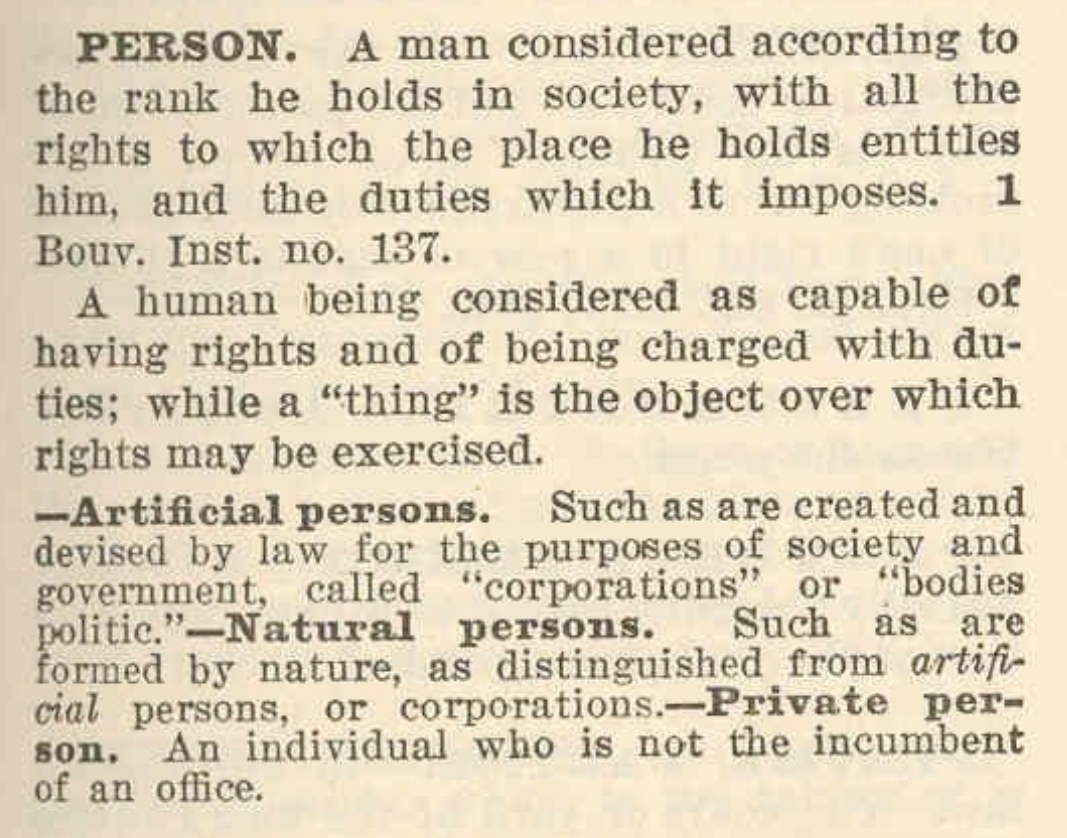General
Persons are representations of people or corporations. Persons do not have the natural rights that people have. See capitis diminutio
Definition of "person" from Black's Dictionary of Law, 2nd edition:
PERSON. A man considered according to the rank he holds in society, with all the rights to which the place he holds entitles him, and the duties which it imposes. 1 Bouv. Inst. no. 137. A human being considered as capable of having rights and of being charged with duties; while a "thing" is the object over which rights may be exercised. - Artificial persons. Such as are created and devised by law for the purposes of society and government, called "corporations" or "bodies politic." - Natural persons. Such as are formed by nature, as distinguished from artificial persons, or corporations. - Private person. An individual who is not an incumbent of an office.

- In general usage, a human being (i.e. natural person), though by statute term may include a firm, labor organizations, partnerships ~ Black's 5th (1979)
Definition of "persona":
- In the civil law, character in virtue of which certain rights belong to a man and certain duties are imposed upon him. Thus one man may unite many characters (personae), as, for example, the characters of father and son, of master and servant. ~ Black's 5th
Religion
For YHWH ... regardeth not persons, nor taketh reward: ~ Deuteronomy 10:17
What is man, that thou art mindful of him? and the son of man, that thou visitest him? ~ Psalm 8:4
"There is but one living and true God, everlasting, without body, parts, or passions; of infinite power, wisdom, and goodness; the Maker, and Preserver of all things both visible and invisible. And in unity of this Godhead there be three Persons, of one substance, power, and eternity; the Father, the Son, and the Holy Ghost." ~ Anglican Articles of Religion
Etymology
early 13c., from Old French persone "human being, anyone, person" (12c., Modern French personne) and directly from Latin persona "human being, person, personage; a part in a drama, assumed character," originally "a mask, a false face," such as those of wood or clay worn by the actors in later Roman theater. OED offers the general 19c. explanation of persona as "related to" Latin personare "to sound through" (i.e. the mask as something spoken through and perhaps amplifying the voice), "but the long o makes a difficulty ...." Klein and Barnhart say it is possibly borrowed from Etruscan phersu "mask." Klein goes on to say this is ultimately of Greek origin and compares Persephone.
In legal use, "corporate body or corporation having legal rights," 15c., short for person aggregate (c. 1400), person corporate (mid-15c.). The use of -person to replace -man in compounds and avoid alleged sexist connotations is recorded by 1971 (in chairperson). In person "by bodily presence" is from 1560s. Person-to-person first recorded 1919, originally of telephone calls.
The Sanskrit pratika as a noun can mean form, appearance, or face and is cognate with πρόσωπον (prósōpon), meaning face, mask, appearance, or person.
